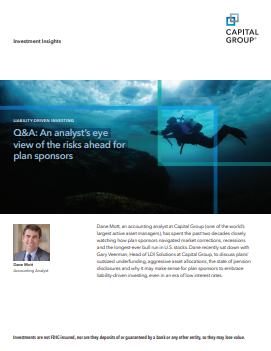In observance of the Christmas Day federal holiday, the New York Stock Exchange and Capital Group’s U.S. offices will close early on Tuesday, December 24 and will be closed on Wednesday, December 25. On December 24, the New York Stock Exchange (NYSE) will close at 1 p.m. (ET) and our service centers will close at 2 p.m. (ET)
Next steps in pension risk management
Capital Group accounting analyst Dane Mott has spent more than two decades assessing corporate pensions. He recently sat down with Gary Veerman, head of LDI solutions, to discuss key pension risk management issues that plan sponsors are facing today. In the second video of a three-part series, Dane and Gary discuss how pension contribution rules have loosened since the Great Financial Crisis and how we view companies’ pension contribution policies and aggressive asset allocations in light of the potential for the rules to tighten.
Contribution policy
Next steps in pension risk management
Interest rates are low and Pension Benefit Guaranty Corporation premiums are rising. How can plan sponsors manage risk in this environment? When can it make sense to issue debt to fund a pension contribution?
Changes in U.S. accounting rules have limited companies’ ability to inflate operating earnings through pension smoothing mechanisms. What’s changed and how has the clarity of companies’ financial statements improved?
Gary Veerman: Hi everyone. My name is Gary Veerman and I lead the LDI solutions business at Capital Group. I’m joined today by my friend and colleague, Dane Mott. Dane works closely with our investors. His expertise is helping them dig deeper into the accounting of companies that we ultimately invest in. And pensions in particular are one of the areas of Dane’s expertise, and today we’d like you to better understand ultimately how we look at those companies’ pensions when making investment decisions for our clients.
Gary Veerman: Dane, great to have you with us today.
Dane Mott: Hey Gary, it’s great to be with you.
Gary Veerman: So contribution relief continues to be more the norm, rather than the exception today. Can you give us some insights, Dane, on how you discuss contribution policy with both the investment team and company management.
Dane Mott: If we look over the past 20 years, for the most part, pension contribution rules have changed considerably over that time period. We had the Pension Protection Act of 2006, which was really the strictest reaction to funding that we’ve had, and since then we’ve seen the rules loosen. In terms of conversations with analysts now, we have to think about contribution policy. The way we think about it is we have to be prepared for the unexpected. Just because the trend has been a general loosening of rules over say the last 15 years, I can envision a scenario if we were ever to get into a severe underfunding crisis for pensions, systematically across the economy, where the government might, or the Congress and presidential administration might decide to make the rules stricter.
Dane Mott: So we have to be prepared for that. Ultimately, as investors, we’re focused on the balance sheet, the income statement and the cash flow. So, contributions play a big part in our financial analysis in both projecting out funded status, projecting what the company’s free cash flow is going to look like. And also, ultimately, what its earning effects are gonna be. And we run models and put in dynamic assumptions about contributions and discount rates and actual returns in making our forecast and to inform us in our conversations with management teams. One of the big considerations is going to be their asset allocation. So if they have one of those very large pension plans relative to their operating businesses and they are taking on aggressive asset allocations, we’ll have discussions with them about those asset allocations, because they’re gonna give us insights about how we might have to be prepared for unexpected contributions in the future, if there should be an adverse event and funding status were to deteriorate.

Dane Mott is a global accounting analyst with 22 years of experience. Prior to joining Capital Group in 2015, Dane was an accounting analyst at his own firm, Dane Mott Research LLC, and at J.P. Morgan and Bear Stearns. He holds an MBA and a bachelor’s degree from New York University. Dane is a CFA charterholder and a certified public accountant.

Gary Veerman is head of LDI solutions at Capital Group. He has 21 years of industry experience and has been with Capital Group for four years. Prior to joining Capital, Gary was managing director and head of U.S. LDI solutions at BlackRock and head of LDI strategy at Legal and General Investment Management America. Before that, he was director of asset allocation research at Rocaton Investment Advisors. He holds a master's degree in global financial analysis from Bentley University and a bachelor's degree in business administration with a concentration in finance from West Virginia University.
Years of experience as of December 31, 2021

An analyst’s eye view of the risks ahead for plan sponsors
Accounting analyst Dane Mott explores pension funding, aggressive asset allocations, and why it may make sense for plan sponsors to embrace liability-driven investing, even in an era of low interest rates.
Connect with our Connect with our liability-driven investing team.
Our dedicated LDI Solutions Team has experience in pension plan risk management across assets and liabilities and can help address your plan’s unique needs.